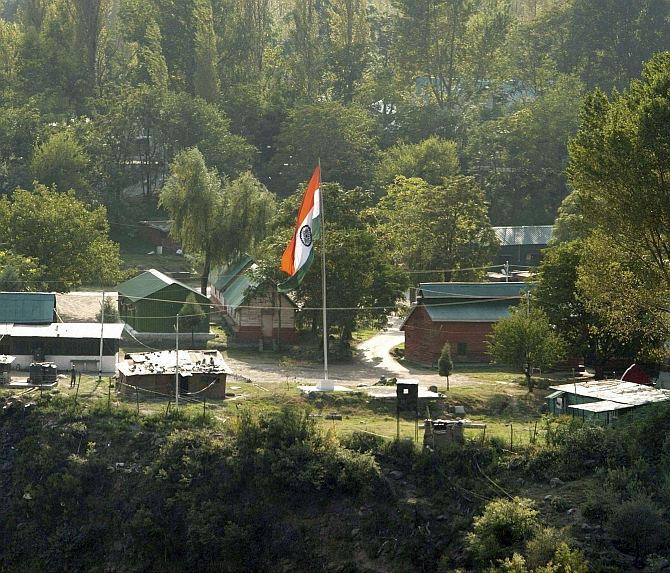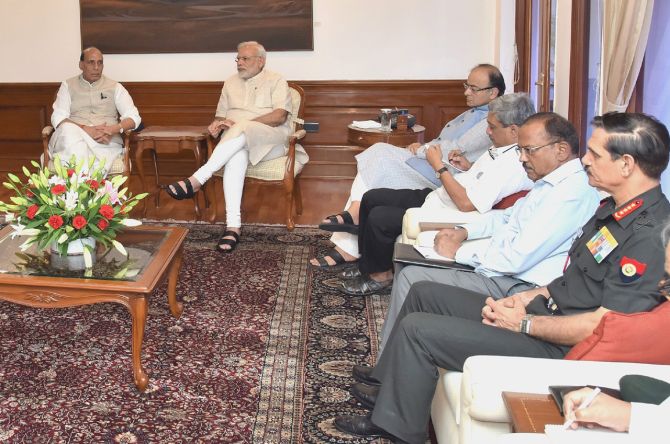graphican
ELITE MEMBER

- Joined
- Jul 21, 2009
- Messages
- 12,433
- Reaction score
- 48
- Country
- Location
ISLAMABAD: Like the post-Uri attack lies of India about Pakistan, the hollowness of New Delhi’s propaganda of getting Islamabad “isolated” has become a joke, even for many Indians.
While the whole world witnessed the interactions of Prime Minister Nawaz Sharif on the sidelines of UN General Assembly session and heard what the world leaders said about Pakistan, these facts have even been shared by some Indians on the social media mocking the Modi government claims.
Sanjiv Bhatt is a former Indian Police Service officer from Gujarat. He is known for his role in filing an affidavit in the Supreme Court of India against the Narendra Modi when he was Chief Minister of the Government of Gujarat. Bhatt had claimed to have attended a meeting, during which Modi had allegedly asked top police officials to let Hindus vent out their anger against the Muslims.
Through his tweet, Bhatt shared his facebook comment on how India “isolated” Pakistan. He wrote:
“1. Russian forces arrive in Pakistan to hold joint military drills snubbing India.
2. Indonesia offers Pakistan defence equipment.
3. Iran wants to be a part of CPEC and link Chabahar port with it built on Indian money.
4. China says it supports Islamabad's stance on Kashmir.
5. OIC says it supports Pakistan's stance on Kashmir.
6. Turkey sending fact finding mission to Kashmir on Pakistan demand.
7. Nepal wants to boost bilateral relations with Pakistan.
8. USA has refrained from naming Pakistan for the Uri Attack.
And our government wants us to believe that Pakistan has been internationally isolated.”
According to Pakistani official source, “Had Goebbels (who was propaganda minister in Nazi Germany) been alive, he would have felt proud seeing the limitless vitriolic and concocted propaganda of BJP-led Indian government against Pakistan. He would have opted to be disciple of Arnab Goswami (Indian journalist) and his likes in Indian propaganda industry.”
As reflected in Sanjiv Bhatt comments, India shamelessly claimed and tried to mislead the world that Russians have called off the joint military exercise with Pakistan. In reality, the Russians landed in Pakistan on Friday for first ever military exercise.
After the Uri attack, Chinese PM Li Keqiang in most unequivocal terms and without mincing words said that Beijing attaches great importance to Islamabad’s position on the Kashmir issue, and "China is standing by Pakistan and will continue to raise their voice in its support at every forum".
Iranian President Hassan Rouhani in his meeting with Prime Minister Nawaz Sharif on the sidelines of the UNGA on Wednesday last expressed a desire to be part of the China-Pakistan Economic Corridor (CPEC). Rouhani said Iran considers Pakistan’s economic development as its own development and added that Pakistan's security is the security of Iran.
Before Prime Minister Muhammad Nawaz Sharif’s address to the UNGA, members of the OIC Organization of the Islamic Cooperation’s Contact Group on Kashmir reaffirmed their solidarity with the valiant Kashmiri people and demanded an end to the repression in Indian-occupied part of the disputed state.
Arab world and Turkey also called upon India to implement the UN Security Council’s resolutions on Jammu and Kashmir. Prime Minister Nawaz Sharif also met top leadership of Britain, Japan and other countries.
USA has unambiguously appreciated Pakistan's performance in Zarb-e-Azb and stated that US wants to remain in constructive relationship and would continue with Strategic Dialogue.
The US administration not only avoided endorsing Indian allegations against Pakistan following Uri attack but to New Delhi’s dismay the State Department spokesman has categorically stated and distanced from India’s effort to stir an International controversy on Balochistan. The state department spokesman said, "The US government respects the unity and territorial integrity of Pakistan, and we do not support independence for Balochistan.”
On Friday, British Army Chief Gen Nick Carter while addressing Pakistani community at Manchester, stated, "there is a strong relationship between Pakistan and UK forces, both are at one page against terrorism. I am one of the admirers of COAS Gen Raheel Sharif and I appreciate his leadership."
Responding to Indian propaganda against Pakistan, a source suggested India, “Don't Build Castles in the Air.”
Regarding Indian allegations of Pakistan’s involvement in the Uri attack, now India herself has started admitting that what was said within hours of the attack was factually wrong. Not only India’s DGMO was proved wrong but the New Delhi’s mantra -- “India now has undeniable evidence against Pakistan” -- has evaporated in the air.
About these Indian lies, a joke has been shared in Pakistan through the social media about the “undeniable evidence” against Pakistan. It reads as:
“Terrorists who attacked Army Camp at Urri had indeed come from Pakistan. Following was recovered from their dead bodies: 1. A signed NOC from DG ISI stating "I hereby grant authorization of attacking Uri to these fine gentlemen. Indian Army to please facilitate entry etc; 2. An autographed handkerchief presented by Pak Army COAS stating "Best Wishes for Uri"; 3. Besides Pakistani CNIC and passport a signed letter by DG NADRA offering full responsibility for any missing documents; 4. A receipt bill from Butt Karahi, Gawalmandi, Lahore depicting 2 kilo DESI KUKKAR KARAHI and 8 NAAN consumed 2 days before the attack; 5. Dhobi and Canteen bills from Headquarters ISI Islamabad; 6. Naswar box containing engraved message -- ‘With love from Bannu’.”
This social media joke about Indian baseless propaganda said that on the basis of these “incriminating evidence”, the Pakistani establishment is in serious trouble and Pakistan is likely to face international isolation.
By Ansar Abbasi
Reference: https://www.thenews.com.pk/print/152735-How-Modis-India-becomes-a-joke-at-home-and-abroad
Now who stands with India
While the whole world witnessed the interactions of Prime Minister Nawaz Sharif on the sidelines of UN General Assembly session and heard what the world leaders said about Pakistan, these facts have even been shared by some Indians on the social media mocking the Modi government claims.
Sanjiv Bhatt is a former Indian Police Service officer from Gujarat. He is known for his role in filing an affidavit in the Supreme Court of India against the Narendra Modi when he was Chief Minister of the Government of Gujarat. Bhatt had claimed to have attended a meeting, during which Modi had allegedly asked top police officials to let Hindus vent out their anger against the Muslims.
Through his tweet, Bhatt shared his facebook comment on how India “isolated” Pakistan. He wrote:
“1. Russian forces arrive in Pakistan to hold joint military drills snubbing India.
2. Indonesia offers Pakistan defence equipment.
3. Iran wants to be a part of CPEC and link Chabahar port with it built on Indian money.
4. China says it supports Islamabad's stance on Kashmir.
5. OIC says it supports Pakistan's stance on Kashmir.
6. Turkey sending fact finding mission to Kashmir on Pakistan demand.
7. Nepal wants to boost bilateral relations with Pakistan.
8. USA has refrained from naming Pakistan for the Uri Attack.
And our government wants us to believe that Pakistan has been internationally isolated.”
According to Pakistani official source, “Had Goebbels (who was propaganda minister in Nazi Germany) been alive, he would have felt proud seeing the limitless vitriolic and concocted propaganda of BJP-led Indian government against Pakistan. He would have opted to be disciple of Arnab Goswami (Indian journalist) and his likes in Indian propaganda industry.”
As reflected in Sanjiv Bhatt comments, India shamelessly claimed and tried to mislead the world that Russians have called off the joint military exercise with Pakistan. In reality, the Russians landed in Pakistan on Friday for first ever military exercise.
After the Uri attack, Chinese PM Li Keqiang in most unequivocal terms and without mincing words said that Beijing attaches great importance to Islamabad’s position on the Kashmir issue, and "China is standing by Pakistan and will continue to raise their voice in its support at every forum".
Iranian President Hassan Rouhani in his meeting with Prime Minister Nawaz Sharif on the sidelines of the UNGA on Wednesday last expressed a desire to be part of the China-Pakistan Economic Corridor (CPEC). Rouhani said Iran considers Pakistan’s economic development as its own development and added that Pakistan's security is the security of Iran.
Before Prime Minister Muhammad Nawaz Sharif’s address to the UNGA, members of the OIC Organization of the Islamic Cooperation’s Contact Group on Kashmir reaffirmed their solidarity with the valiant Kashmiri people and demanded an end to the repression in Indian-occupied part of the disputed state.
Arab world and Turkey also called upon India to implement the UN Security Council’s resolutions on Jammu and Kashmir. Prime Minister Nawaz Sharif also met top leadership of Britain, Japan and other countries.
USA has unambiguously appreciated Pakistan's performance in Zarb-e-Azb and stated that US wants to remain in constructive relationship and would continue with Strategic Dialogue.
The US administration not only avoided endorsing Indian allegations against Pakistan following Uri attack but to New Delhi’s dismay the State Department spokesman has categorically stated and distanced from India’s effort to stir an International controversy on Balochistan. The state department spokesman said, "The US government respects the unity and territorial integrity of Pakistan, and we do not support independence for Balochistan.”
On Friday, British Army Chief Gen Nick Carter while addressing Pakistani community at Manchester, stated, "there is a strong relationship between Pakistan and UK forces, both are at one page against terrorism. I am one of the admirers of COAS Gen Raheel Sharif and I appreciate his leadership."
Responding to Indian propaganda against Pakistan, a source suggested India, “Don't Build Castles in the Air.”
Regarding Indian allegations of Pakistan’s involvement in the Uri attack, now India herself has started admitting that what was said within hours of the attack was factually wrong. Not only India’s DGMO was proved wrong but the New Delhi’s mantra -- “India now has undeniable evidence against Pakistan” -- has evaporated in the air.
About these Indian lies, a joke has been shared in Pakistan through the social media about the “undeniable evidence” against Pakistan. It reads as:
“Terrorists who attacked Army Camp at Urri had indeed come from Pakistan. Following was recovered from their dead bodies: 1. A signed NOC from DG ISI stating "I hereby grant authorization of attacking Uri to these fine gentlemen. Indian Army to please facilitate entry etc; 2. An autographed handkerchief presented by Pak Army COAS stating "Best Wishes for Uri"; 3. Besides Pakistani CNIC and passport a signed letter by DG NADRA offering full responsibility for any missing documents; 4. A receipt bill from Butt Karahi, Gawalmandi, Lahore depicting 2 kilo DESI KUKKAR KARAHI and 8 NAAN consumed 2 days before the attack; 5. Dhobi and Canteen bills from Headquarters ISI Islamabad; 6. Naswar box containing engraved message -- ‘With love from Bannu’.”
This social media joke about Indian baseless propaganda said that on the basis of these “incriminating evidence”, the Pakistani establishment is in serious trouble and Pakistan is likely to face international isolation.
By Ansar Abbasi
Reference: https://www.thenews.com.pk/print/152735-How-Modis-India-becomes-a-joke-at-home-and-abroad
Now who stands with India
- Bangladesh
- Afghanistan
- And its imaginations
Last edited:














